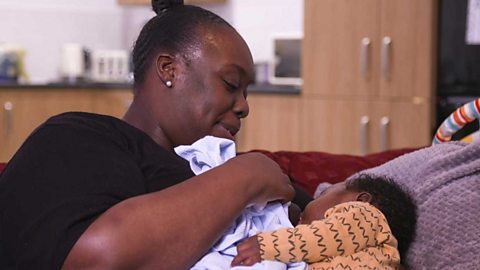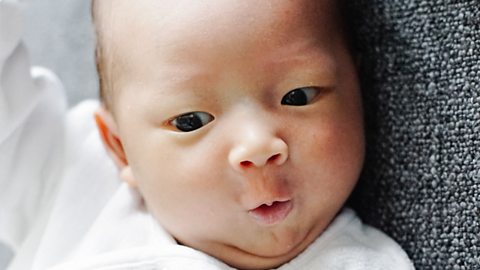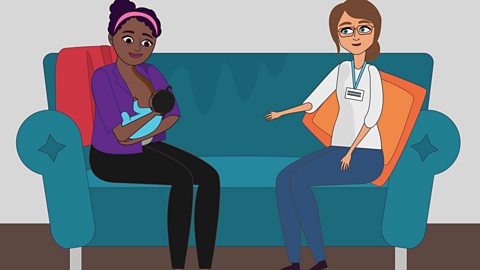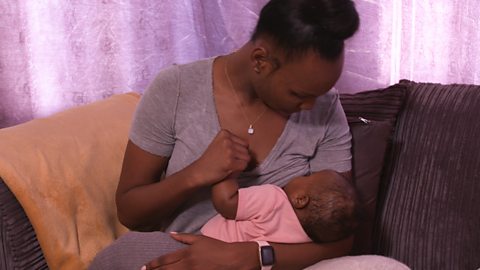Your baby canÔÇÖt talk but theyÔÇÖre speaking to you in lots of other non-verbal ways. They use their bodies to tell you what they want and how theyÔÇÖre feeling, and this includes when theyÔÇÖre hungry.
ÔÇťBabies communicate through their behaviour from the moment they're born. In fact, theyÔÇÖre communicating before they're born, reacting to sounds like music or activities like mum having a bath. They are great at getting their message across,ÔÇŁ explains Inge Nickell, Director of the , a national charity promoting an understanding of newborn babiesÔÇÖ communication. ÔÇťThey show us all sorts of things, what they like and what they don't like, their strengths and sensitivities through their behaviour.ÔÇŁ

Recognising feeding cues is a learning process
Getting to know your babyÔÇÖs signals is all part of the process of getting to know them, explains Inge.
Your baby is unique and the only way to get to know them, like any new person in your life, is by spending time with them. And it takes time: you don't meet someone for the first time and think, ÔÇśRight, we know each other!ÔÇÖ and itÔÇÖs no different with your baby.
An important part of reading your babyÔÇÖs cues is identifying their six states of alertness. There are three sleep states: deep sleep, active or light sleep ÔÇô when they make lots of small movements including fluttering eyelids and drowsy. And there are three awake states: quiet alert ÔÇô a great window to feed them, alert but fussy and finally crying. Babies shift quickly between these states but not always in the same sequence.
ÔÇťWhen you can recognise these states and what they might mean, youÔÇÖll be able to respond to your baby and understand their needs. TheyÔÇÖll be calmer because their needs are met and theyÔÇÖll learn that they can trust you. This allows them to focus on engaging with you, which is where they learn about the world. And it's these mutual interactions that help you both feel secure and to bond,ÔÇŁ adds Inge.
Common feeding cues
Newborns need frequent feeds and learning your babyÔÇÖs individual hunger cues can help guide when these happen.
Knowing when your baby wants a feed and responding to them before they get upset and start to cry is a gradual thing, but keeping them close to you will help you with this learning process.
ÔÇťAll babies are different, so it's important parents watch their baby and look for their particular cues,ÔÇŁ says Inge.
Click through the slideshow for some of the most common cues - these include:
- Rooting (turning their head and opening their mouth when their mouth or cheek is touched) or opening their mouth
- Lip licking/smacking
- Stretching
- Sucking fingers
- Making fists
- Moving and wriggling
Another one to look out for is babies opening/closing and moving their eyes.
In time, youÔÇÖll also learn what signals your baby has to say: ÔÇťIÔÇÖm full now, thanks!ÔÇŁ.

Image caption, Rooting or opening mouth
1 of 6
And learning when they donÔÇÖt need feeding
Crying is the strongest cue your baby will use to communicate their need for milk ÔÇô the kind of last resort to get your attention. But if theyÔÇÖre crying, it doesnÔÇÖt automatically mean they need a feed ÔÇô it can mean that they need to change position or have a cuddle.
So, learning to recognise their different behavioural states and cues will not only help you recognise when they need to feed but when they donÔÇÖt.ÔÇŁ explains Inge. ÔÇťFor example, during the active sleep state when there's lots of movements and noises, they might even do a little cry. And you might think they need feeding. But actually, they're not quite ready and they can become disorientated if you try to feed them.ÔÇŁ

But donÔÇÖt worry: all this is part of the getting to know your baby, reassures Inge.
ÔÇťEven though sometimes you have to try different things before you get it right, your baby will soon learn that you know what theyÔÇÖre trying to say and that you will help them.ÔÇŁ
YouÔÇÖll learn new things about your baby every day ÔÇô but reading your baby really is the best book and guidance.ÔÇŁ
For more advice on feeding your newborn, check out the






